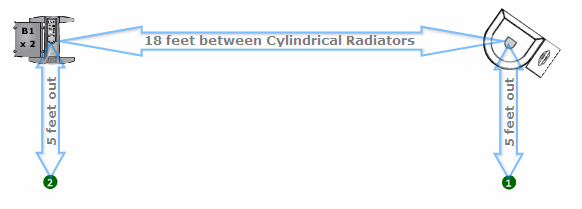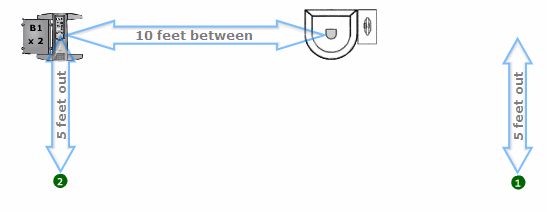Model I and Model II Comparison / Stage Monitoring Experience
|
This article is an editorial and expresses the opinion and experience of the author. Please post comments in the discussion page.
|
Objective: To find out if I should approach stage layouts differently with the Model II (compared to the Model I). Specifically - would I set up things differently for the performers at the outer edges of the stage.
First: If you are in front of them, playing through the T1® through the Model I and Model II sound very similar to me. Similar enough that I would not significantly change the way I set up a stage as a solo performer. Nor would I feel it absolutely necessary to stop using my Classic for rehearsal, if using my Model II for performance.
I'll leave the differences for a different discussion.
Assumptions:
- Ensemble - up to four performers. The stage is 20 feet wide.
- Shallow stage (only room to get 5 feet in front of the L1™).
Gear setup:
- Microphone to T1®
- T1 ToneMatch® connection to Model II
- T1® Aux connection to Classic
- No effects
- On axis volume is the same at 15 feet (Classic and Model II)
- I listened to only one L1® at a time by alternately muting the Aux and turning the Master volume off.
Here's a picture of what I tested.
Initially I had both the Classic and the Model II aimed straight out.
I went to position  and listened to what I heard coming from the Model II.
and listened to what I heard coming from the Model II.
I went to position  and listened to what I heard coming from the Classic.
and listened to what I heard coming from the Classic.
I rotated the Classic to the point that I found the sound at  to be similar to
to be similar to 
Part II.
Instead of rotating the Classic, I moved it toward the middle of the stage until what I heard was similar at both points 1 and 2.
This is where I ended up.
A couple of important things to consider.
I was trying to simulate
- a shallow stage
- vocal only
- performer's perspective (can I hear myself well enough to perform comfortably)
With the Classic, on a shallow stage I have sometimes
- Rotated the outermost Systems in toward the middle to help with monitoring.
- = or = - - Moved the outermost Systems in toward the middle to help with monitoring.
- Negotiated to get more stage depth.
This is *not* new.
What *is* new is that I felt no need to do that with the Model II.
I see this as a by-product of the extremely smooth distribution of the sound delivered by the Model II. It is not a detractor from the Classic (or Model I) but something to be considered when thinking about shallow stages and especially if playing into wide rooms.
